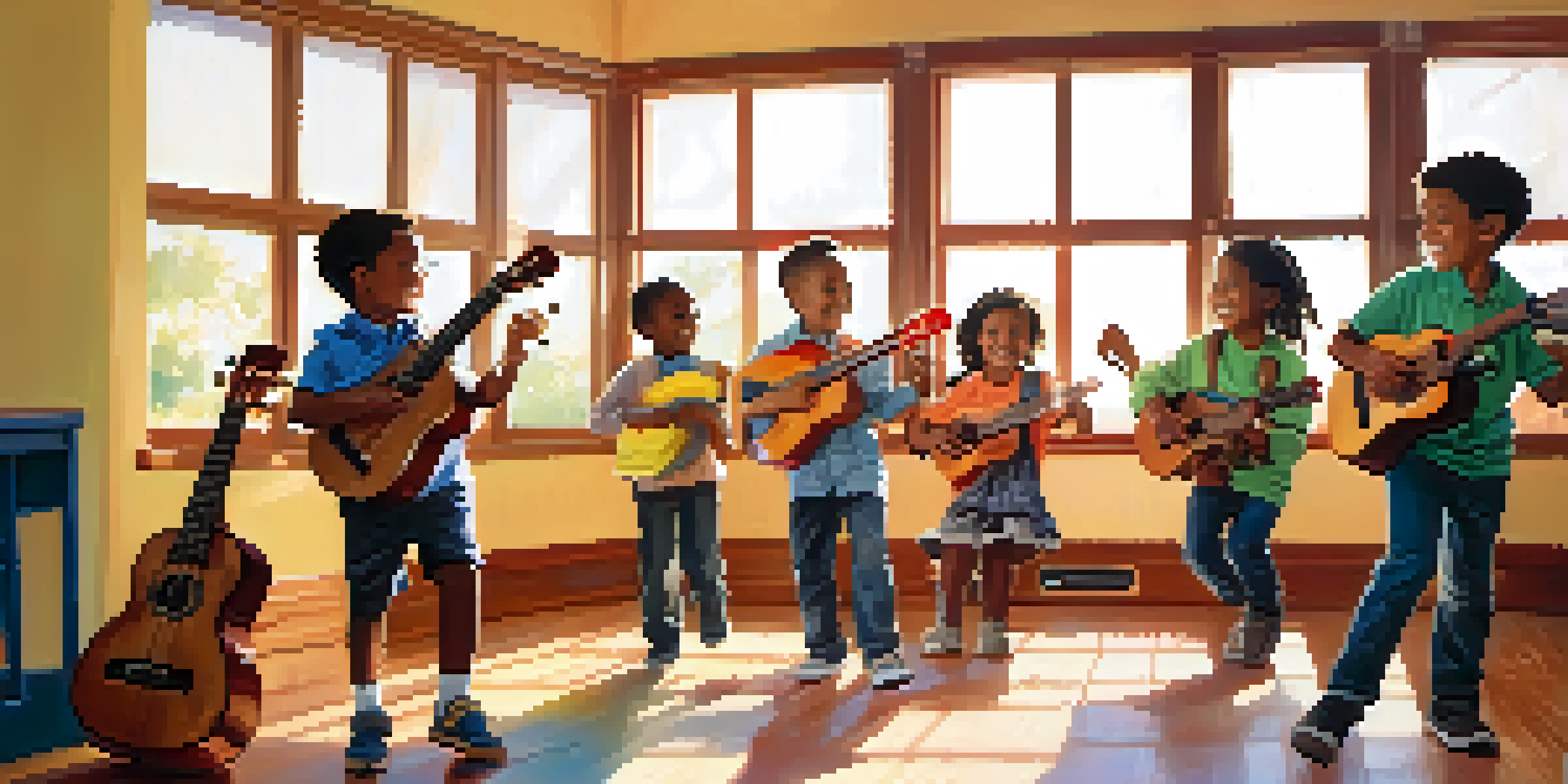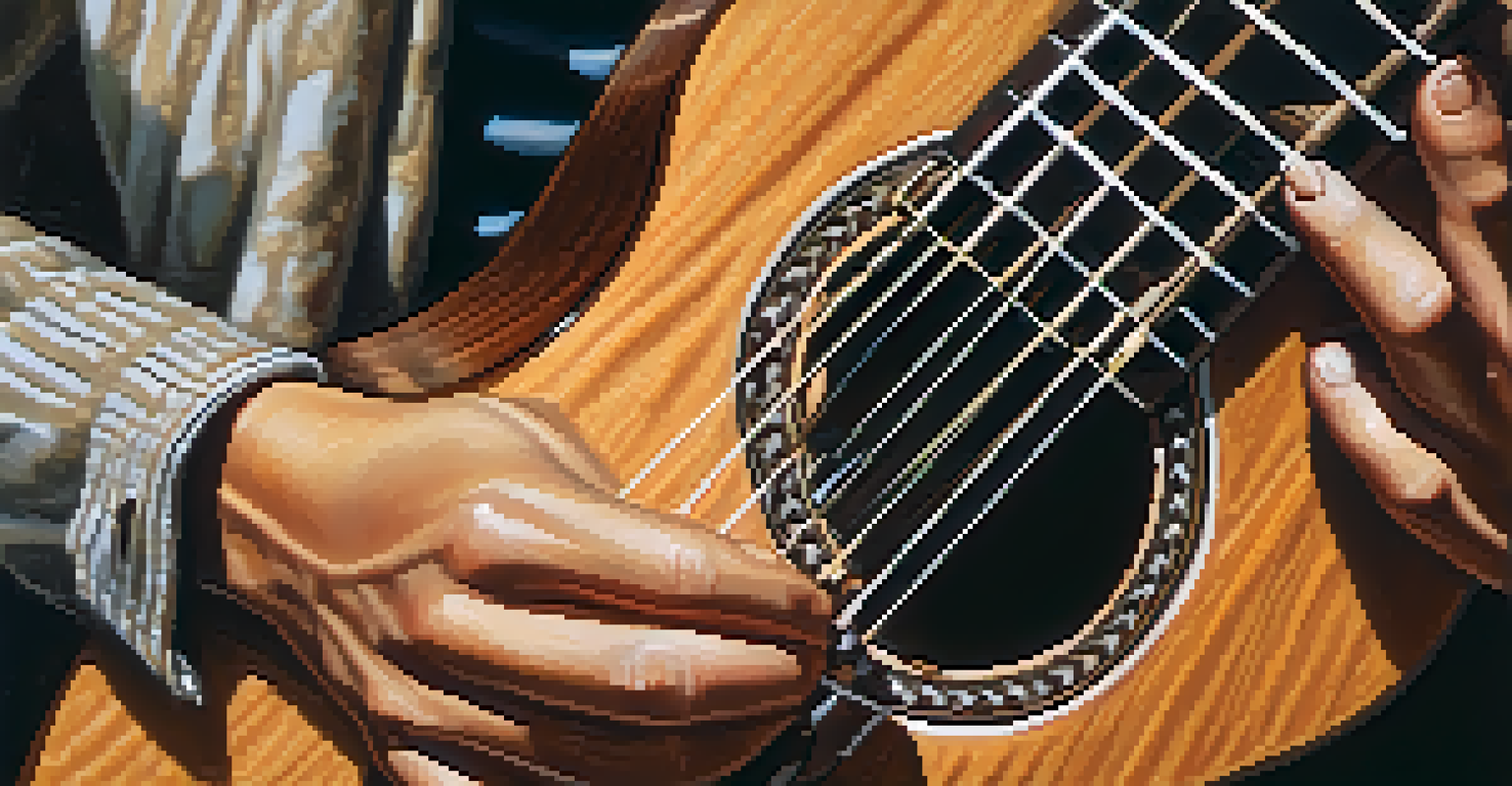Engaging Students with Ukulele: A Fun Approach to Music

Why Ukulele? The Perfect Introductory Instrument
The ukulele is an excellent choice for beginners due to its small size and light weight. This makes it easy for students of all ages to handle and play. With only four strings, the ukulele simplifies learning chords, which can boost student confidence early on.
The ukulele is a great instrument for beginners because it is small and easy to handle, allowing anyone to start making music right away.
Additionally, the ukulele has a cheerful sound that instantly lifts spirits, making practice sessions more enjoyable. As students strum along, they can create beautiful music without feeling overwhelmed by complex techniques. This positivity can foster a love for music that lasts a lifetime.
Finally, the accessibility of the ukulele is noteworthy. Affordable options are widely available, and many online resources cater to beginners, ensuring that students can learn at their own pace. This combination of ease and fun makes the ukulele an ideal instrument for engaging young musicians.
Creating a Fun Learning Environment
To effectively engage students, it's crucial to create a fun and welcoming learning environment. Incorporating games and interactive activities can make lessons exciting and dynamic. For example, you could organize a 'ukulele battle' where students showcase their skills in a friendly competition.

Using popular songs that students enjoy can also enhance their motivation to practice. When students can play tunes they recognize and love, they'll be more inclined to pick up the ukulele regularly. This connection between personal interest and learning is vital.
Ukulele: Ideal for Beginners
The ukulele's small size, cheerful sound, and four-string simplicity make it a perfect introductory instrument for new musicians.
Encouraging collaboration among students can further enrich this environment. Group activities, such as playing in ensembles or creating their own songs, can foster teamwork and build camaraderie. These social aspects of learning make the process more enjoyable and memorable.
Incorporating Technology into Ukulele Lessons
Technology can enhance the learning experience for students, making lessons more engaging. For instance, using apps that teach ukulele chords or provide backing tracks can help students practice more effectively. These tools can offer instant feedback, allowing students to see their progress in real-time.
Music is the universal language of mankind.
Video tutorials are another fantastic resource that students can access outside of class. They can watch and replay lessons at their own pace, ensuring they fully grasp each concept. This flexibility helps accommodate different learning styles, enabling all students to thrive.
Moreover, online platforms can facilitate virtual jam sessions, connecting students with peers from around the world. This global interaction not only enhances musical skills but also promotes cultural exchange and understanding, making learning both fun and enriching.
Building Confidence Through Performance
Performance opportunities play a crucial role in boosting students' confidence. Organizing casual showcases or open mic nights allows students to present what they've learned in a supportive environment. These events can help demystify the idea of performing and encourage students to embrace the spotlight.
As students prepare for performances, they develop essential skills such as teamwork, communication, and resilience. The experience of playing in front of an audience can be both thrilling and nerve-wracking, but overcoming these challenges leads to personal growth.
Engaging Learning Environments
Creating fun, interactive lessons with games and popular songs keeps students motivated and fosters a love for music.
Additionally, celebrating achievements—no matter how small—can reinforce their progress. Recognizing their efforts fosters a positive mindset and encourages them to continue striving for improvement. This supportive atmosphere is key to nurturing a lifelong passion for music.
Encouraging Creativity with Songwriting
Songwriting can be a powerful way to encourage creativity among students. Allowing them to write their own lyrics and melodies gives them the freedom to express their thoughts and emotions. This creative outlet can deepen their connection to music, making lessons even more meaningful.
Utilizing simple chord progressions on the ukulele can make songwriting accessible for everyone. Students can experiment with different styles and themes, which can lead to unique and personal compositions. This hands-on experience fosters a sense of ownership over their musical journey.
Collaborative songwriting projects can also be a fun way to engage students. Working together to create a song can strengthen relationships and build a sense of community. These experiences not only enhance musical skills but also create lasting memories.
Understanding Music Theory Through Ukulele
The ukulele is a fantastic tool for introducing basic music theory concepts. Students can learn about scales, chords, and rhythm patterns in a hands-on manner. By applying these concepts directly to their instrument, they can better understand the foundations of music.
For example, learning how to construct chords on the ukulele helps students recognize patterns that apply to other instruments as well. This understanding can empower them to explore different musical avenues beyond the ukulele. The simplicity of the ukulele makes these concepts less intimidating.
Fostering Creativity Through Songwriting
Encouraging students to write their own songs enhances their creativity and connection to music, making lessons more meaningful.
Incorporating music theory into lessons also helps students develop a more comprehensive understanding of music. This knowledge can enhance their overall musicianship and prepare them for more advanced studies in the future. The ukulele serves as a gateway to a broader musical education.
Fostering Lifelong Love for Music
Ultimately, engaging students with the ukulele goes beyond teaching an instrument; it's about fostering a lifelong love for music. By making lessons enjoyable and relevant, educators can inspire students to explore music throughout their lives. This passion can lead to a variety of experiences, from playing in bands to composing their own songs.
Encouraging students to continue their musical journey outside the classroom is essential. Whether through joining community groups or participating in online forums, staying connected to music can maintain their enthusiasm. The ukulele can serve as a constant companion, welcoming them back whenever they need a creative outlet.

As students discover the joy of music through the ukulele, they may find it enriches their lives in unexpected ways. Music can be a source of comfort, connection, and expression, and introducing students to this world is a gift that lasts a lifetime.